Professor Hans G. Tillmann (1936 - 2021)
10.11.2021
We are deeply saddened to learn on November, 10th, 2021 that our dearly valued founder and former director of the institute, Hans G. (Tim) Tillmann, passed away on November, 8th, 2021. We will miss him greatly.
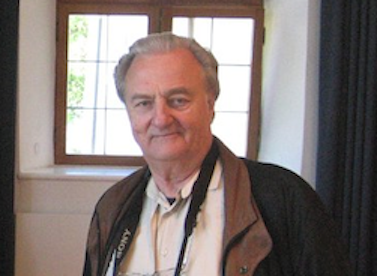
Sound Change Workshop Kloster Seeon, May 2012
The IPS mourns the passing of its founder Hans Tillmann.
Born in 1936 Hans Tillmann as a young man was much influenced by Karlheinz Stockhausen and initially considered becoming a composer, but finally decided on the study of phonetics and communication theory with W. Meyer-Eppler in Bonn. From Bonn he moved to Munich in 1971 to set up the new Institut für Phonetik und Sprachliche Kommunikation, as it was then known, directing it until his retirement.
His influence on the development of speech research in Munich, in Germany, and beyond, was huge. This can be attributed to a very clear vision of two crucial prerequisites for successful research. On the one hand, he had a very clear conception of phonetics as a key discipline for a comprehensive understanding of human communication, in which it covers, firstly, the physical instantiation in all its forms of the semantic side of communication, and, secondly, the processing of these instantiations by human perceivers and potentially also by machines. This was a truly high-level conception of the discipline that did not even shy away from the more philosophical aspects of speech-act theory. On the other hand, he had a clear vision for how research into speech can be put into practice, specifically by exploiting the potential of digital signal processing. In the early 1970s this was a daring approach for a professor in a humanities faculty (a professor who would not even shy away from programming a PDP11 computer in Assembler, if necessary). But Tillmann had been one of the very first to realize that the digital domain was not only ideal for the analysis of speech production data, whether acoustic, aerodynamic or articulatory, but was also ideal for manipulating speech signals to generate perception stimuli systematically and reproducibly. Only on this basis was it possible to make one of his key insights amenable to scientific enquiry: namely that the link between speech signals and their perceptual consequences is not a logical one, but an empirical one – and thus needs experimental elucidation
This is not the place to go into all the many projects that his energy and enthusiasm initiated over the years. More important now, as we pay tribute to the man behind this unceasing activity, is to remember how clearly he demonstrated to us that doing good science is also a matter of working and interacting with people, whether expressed in his generous praise of junior staff or the friendships he built up in other labs all over the world.
And for all his commitment to our discipline he always made it clear that there are many things beyond phonetics that make life worth living. Music remained part of his life throughout, but it was also always simply fun to travel with him and combine scientific interactions with discovering interesting places to visit or restaurants in exotic locations to try out.
We are privileged to have been able to spend so many years working with him and learning from him. Our thoughts now are with his wife, daughters and grandchildren.
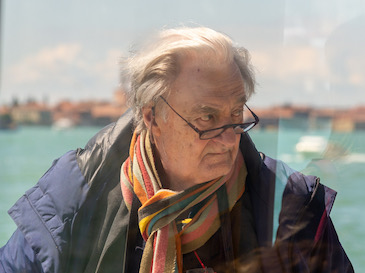
Venice, May 2019
Tim and the BAS
by Florian Schiel
The first time I met Tim in the mid nineties I did not understand a single word of what he was talking about, and - being young, ignorant and arrogant - I thought that he was quite crazy. But he looked knowingly at me, and after a few more encounters in Canada he offered me, a freshman engineer, a job at his institute. Not a very interesting job, it's true, but he said that I could take as much time off this job as needed for a post-doc stay in Berkeley. This was tempting, so I took the job, and left for California shortly afterwards. A few months into my post-doc stay Tim suddenly appeared on my doorstep and took me to the best wine store in Berkeley, where he purchased three bottles of wine for us. Back in our garden, after some barbecue and a delicious first bottle, he told me that he had a vision and that I was an essential part of it. First I laughed but he was quite sober about it, and after bottle number three we shook hands on his plan. The next day he was gone back to Munich. I finished my post-doc, returned to the institute, and Tim and I immediately set to work. Half a year later the Bavarian Archive for Speech Signals was borne, and my professional life had been changed forever.
That was 25 years ago, and with very few interruptions I worked with Tim until he became Emeritus. We travelled all over the world, we debated and sometimes fought bitterly over political and technical details, our opinions differed on a lot of topics, but we never lost our mutual respect and our trust in each other. Tim's Berkeley vision came true in most parts: digital speech processing is now a key science and technology, and our early engagement in this field led his institute into a new area of empirical humanities: there were times when no major speech project in Germany was even thinkable without Hans Tillmann from Munich. The BAS flourished and grew under his leadership (and still is growing), and the BAS WebServices (something that Tim had always wished for from the very beginning) are so ubiquitous in the speech sciences that many scientists nowadays use the verb "to maus" in their daily speech. Tim was not only a visionary but also a hands-on scientist (I just say "FORTRAN"), a passionate mathematician (I just say "Complex numbers"), but mainly a very generous person: when cash started to flow in from our success with the BAS, he used the bigger part of it to hire and engage students and post-docs in digital speech processing. He was also a famous host on many occasions; today we may not remember the scientific details of the many big, important projects, workshops or conferences from that era, but every participant I know today still remembers Tim.
by Christoph Draxler
Upon my return to Munich, having just finished my thesis on databases and logic programming, I was introduced to Hans Tillmann. Quickly, he became interested in analysing empirical phonetic data using query languages, and I got drawn into the wonders of human spoken language. Hans Tillmann was a driving force behind many German and European projects aimed at creating large collections of speech data, he knew incredibly many people, and he was welcome everywhere – if he couldn't attend one conference (probably, because he was attending another one) – people always asked me to extend their greetings, combined with a wish to see him again soon.
Over the years, during which he became Tim, I watched him organise the founding of the Bavarian Archive of Speech Signals, fight to avert closing down the institute, bring together young researchers from (very) different fields, engage in ever new collaborations, encourage us to explore our personal paths, and find the perfect successor to continue what has truly become a leading institute worldwide.
Above all was his generosity: he willingly shared his experience, his vision of human communication, his love for music, his good humour, and his joy of life.
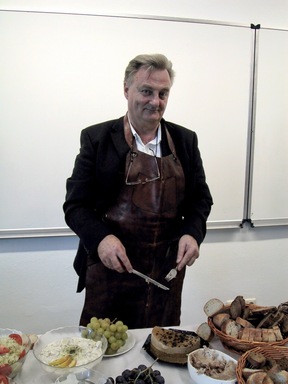
40 years of phonetics with Tim Tillmann
by Phil Hoole
Could the pensive young man in this photo from the pioneering days of EMA (Barbara Kühnert in the background) have ever suspected that Tim's last talk to a phonetic audience would be at his own retirement, just a few months ago?
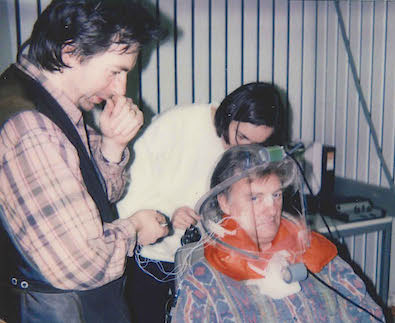
I can't do justice in these lines to everything we experienced together and all the support I received from him over the intervening years. I am just grateful that we managed to squeeze this opportunity for what would be a last meeting and a last glass raised together out of the Covid restrictions. The words he addressed to me were characteristically - for me embarassingly - generous,
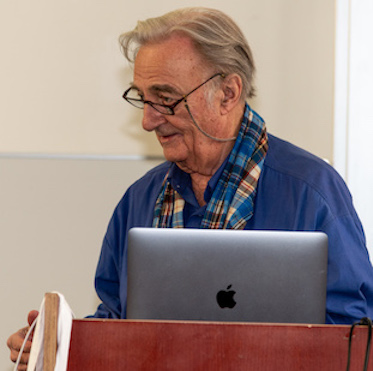
somehow managing to embed them in a characteristically, shall we say, wide-ranging review of phonetics in Germany.
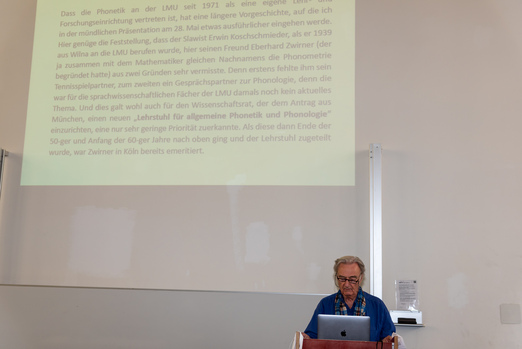
So I am thankful that these last memories will indeed be so characteristic: the passion for both phonetic detail and the big picture, coupled with his interest and involvement in the people behind the science.
My first encounter with Hans Tillmann...
by Bernd Möbius
My first encounter with Hans Tillmann was as a first-year phonetics student in Bonn. He was invited by Gerold Ungeheuer for a small colloquium, which quickly developed into an hours-long scientific dialog between Ungeheuer and Tillmann about communication theory at large, involving Spinoza, Leibniz, Kempelen, Searle, Scripture, ... (you get the picture). They should have recorded the whole thing and publish it. Of course, I did not understand most of it but was duly and utterly impressed.
Years later I was supposed to present a project proposal at a meeting of the priority program on intonation at the German Research Foundation (DFG), which was just a tram ride from the Bonn phonetics lab. On the tram I met Hans Tillmann again, and during the 15 minutes walk from the tram station to the DFG building he somehow managed to remove all my anxiety of having to present the proposal: me, with my recent magister degree under the belt, in front of all the big names I only knew from literature: Cutler, Ladd, Garding, Fischer-Jørgensen, Bannert, and, yes, Tillmann. The grant was approved, funding the first two years of my PhD!
I also remember a night out with Tim and Hartmut and Michiko during ICPhS 2003 in Barcelona. After a dinner in a traditional restaurant, we sampled the best brandies in virtually every bar on the way from Barrio Gòtico to the hotel near Montjuic - a long distance and a long night. Fortunately, my conference presentation was already on the previous day. Needless to say, Tim generously picked up all the bills. In a similar context, we enjoyed a long night in the castle in Eichstätt during ESSV 2015 until we were sent home by the staff.
Tim will be deeply missed by me and all phoneticians in Saarbrücken. He met everybody, and in particular the young researchers, with respect, friendliness, and encouragement. And of course, we learned so much from him and his work.
My teacher
by Susi Burger
When you, the college freshman, hear during the introduction to your exotic subject that you have decided to study after much consideration and doubt, that you will probably not have a job after you graduate, you feel a bit intimidated.
This is what had happened to my friend Lucky and me in the fall of 1986 listening to Professor Tillmann's introduction to Phonetics at the LMU Munich.
We still stayed, maybe because we got curious, maybe because seconds later he had pulled us in with his excitement about human communication, his humor, and the pure power and intensity of his existence.
The teaching was very often far above what our little brains could understand, the KFA (Kleiner Fortan Ausschnitt (little Fortran subset)), the digital vectors, and the everything explaining "Zahlenuhr". I mean, we had expected to learn something around pronunciation, dialects, and how we can distinguish between click sounds and Chinese tones. Professor Tillmann, instead, convinced us to do a bit of math and computer science on the side (still didn’t understand the KFA and the Zahlenuhr). But there was a lot more to it than just surviving his teaching. We quickly became his Schützlinge (the word fosterling is probably the closest translation). He strategically placed us in important large national and international projects around automatic speech recognition and machine translation. He recognized our individual potentials and pushed us to use them as managers and researchers. He took us on excursions, such as the famous one to the South of France where he taught us how to taste wine, he climbed on Bavarian mountains with us, or had us eat unknown foods at interesting restaurants all over the world. He made us have dinner with the Creme-de-la-Creme of speech research, like Gunnar Fant, Peter Ladefoged, or John O'Hala. He showed us how to network, how to enter a room, and how to always sit in the first row.
Over the years, Professor Tillmann became Tim to me. A friend who made sure that I was okay after my father died, who trusted me doing difficult negotiations but still reassured me that he would be there for me day and night if I needed help. He visited me several times in Pittsburgh where I live, sang good night songs to my children, recommended which Trader Joe’s wine I needed to buy, played a little Chopin on my piano, and had a quick run through the arts museum which he of course knew better than I.
And yes, I had jobs around speech and language all the time. I still have. I got them because people knew what house I come from.
Thank you, Tim.
RIP TIM
by Dr. Hans Hofmann-Reinecke
Liebe Freunde des IPK,
Hier ein paar verblasste Polaroids vom Herbst 1977, d.h. 44 Jahre alt.
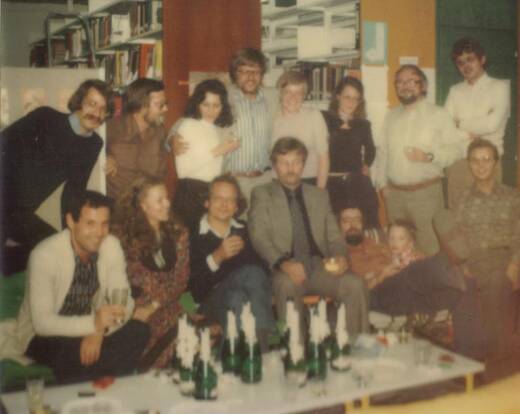
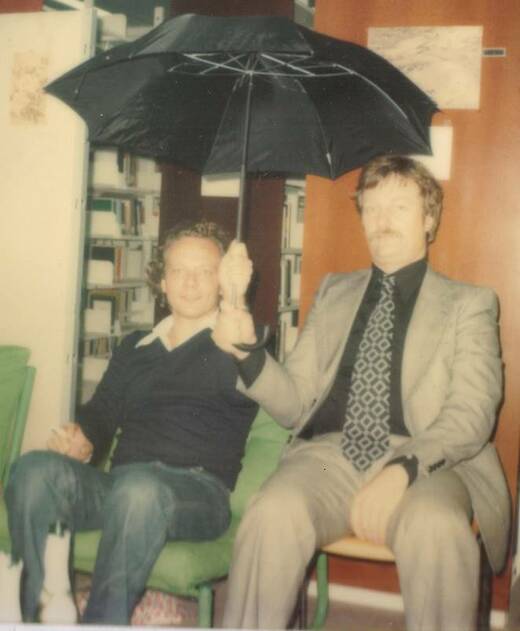
Der Regenschirm war übrigens nicht ganz unproblematisch. Tim und ich hatten ihn 1976 in Hartford / Conn gekauft, anlässlich der IEEE / Phonetica Tagung. Es konnte nie geklärt werden, wessen rechtliches Eigentum er war, aber ich überließ ihn dann dem Institut.
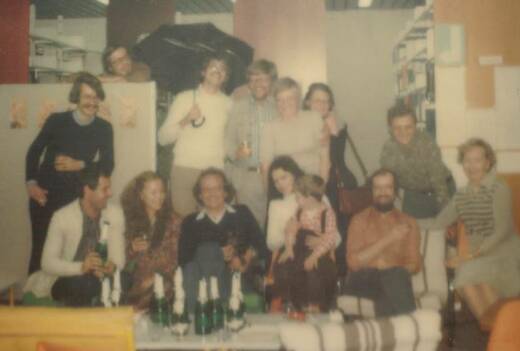
Es waren herrliche Jahre am IPK, geprägt vom souveränen Geist und kühlen Humor des großen Meisters.
Hans
If you would like to post something about Tim on this page, please contact schiel@phonetik.uni-muenchen.de

